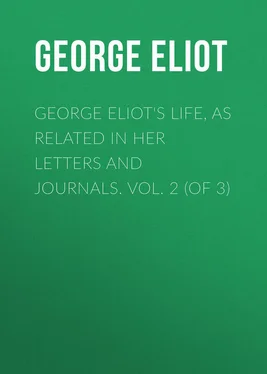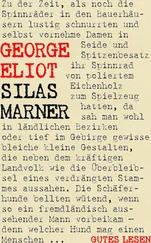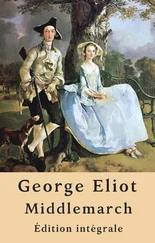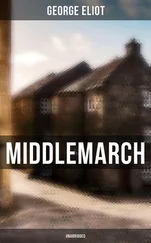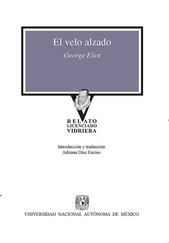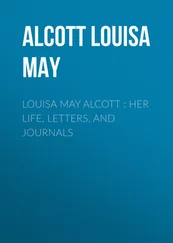George Eliot - George Eliot's Life, as Related in Her Letters and Journals. Vol. 2 (of 3)
Здесь есть возможность читать онлайн «George Eliot - George Eliot's Life, as Related in Her Letters and Journals. Vol. 2 (of 3)» — ознакомительный отрывок электронной книги совершенно бесплатно, а после прочтения отрывка купить полную версию. В некоторых случаях можно слушать аудио, скачать через торрент в формате fb2 и присутствует краткое содержание. Издательство: Иностранный паблик, Жанр: literature_19, foreign_antique, foreign_prose, на английском языке. Описание произведения, (предисловие) а так же отзывы посетителей доступны на портале библиотеки ЛибКат.
- Название:George Eliot's Life, as Related in Her Letters and Journals. Vol. 2 (of 3)
- Автор:
- Издательство:Иностранный паблик
- Жанр:
- Год:неизвестен
- ISBN:нет данных
- Рейтинг книги:3 / 5. Голосов: 1
-
Избранное:Добавить в избранное
- Отзывы:
-
Ваша оценка:
- 60
- 1
- 2
- 3
- 4
- 5
George Eliot's Life, as Related in Her Letters and Journals. Vol. 2 (of 3): краткое содержание, описание и аннотация
Предлагаем к чтению аннотацию, описание, краткое содержание или предисловие (зависит от того, что написал сам автор книги «George Eliot's Life, as Related in Her Letters and Journals. Vol. 2 (of 3)»). Если вы не нашли необходимую информацию о книге — напишите в комментариях, мы постараемся отыскать её.
George Eliot's Life, as Related in Her Letters and Journals. Vol. 2 (of 3) — читать онлайн ознакомительный отрывок
Ниже представлен текст книги, разбитый по страницам. Система сохранения места последней прочитанной страницы, позволяет с удобством читать онлайн бесплатно книгу «George Eliot's Life, as Related in Her Letters and Journals. Vol. 2 (of 3)», без необходимости каждый раз заново искать на чём Вы остановились. Поставьте закладку, и сможете в любой момент перейти на страницу, на которой закончили чтение.
Интервал:
Закладка:
May 20. – As I had a feeble head this morning, we gave up the time to seeing pictures, and went to the Neue Pinacothek . A "Lady with Fruit, followed by three Children," pleased us more than ever. It is by Wichmann. The two interiors of Westminster Abbey by Ainmueller admirable. Unable to admire Rothmann's Greek Landscapes, which have a room to themselves. Ditto Kaulbach's "Zerstörung von Jerusalem."
We went for the first time to see the collection of porcelain paintings, and had really a rich treat. Many of them are admirable copies of great pictures. The sweet "Madonna and Child," in Raphael's early manner; a "Holy Family," also in the early manner, with a Madonna the exact type of the St. Catherine; and a "Holy Family" in the later manner, something like the Madonna Delia Sedia, are all admirably copied. So are two of Andrea del Sarto's – full of tenderness and calm piety.
May 23. – Through the cold wind and white dust we went to the Jesuits' Church to hear the music. It is a fine church in the Renaissance style, the vista terminating with the great altar very fine, with all the crowd of human beings covering the floor. Numbers of men!
In the evening we went to Bodenstedt's, and saw his wife for the first time – a delicate creature who sang us some charming Bavarian Volkslieder . On Monday we spent the evening at Löher's – Baumgarten, ein junger Historiker , Oldenbourg, and the Bodenstedts meeting us.
Delicious Mai-trank , made by putting the fresh Waldmeister – a cruciferous plant with a small white flower, something like Lady's Bedstraw – into mild wine, together with sugar, and occasionally other things.
May 26. – This evening I have read aloud "Adam Bede," chapter xx. We have begun Ludwig's "Zwischen Himmel und Erde."
May 27. – We called on the Siebolds to-day, then walked in the Theresien Wiese, and saw the mountains gloriously. Spent the evening at Prof. Martius's, where Frau Erdl played Beethoven's Andante and the Moonlight Sonata admirably.
May 28. – We heard from Blackwood this morning. Good news in general, but the sale of our books not progressing at present.
Letter to John Blackwood, 28th May, 1858.
It is invariably the case that when people discover certain points of coincidence in a fiction with facts that happen to have come to their knowledge, they believe themselves able to furnish a key to the whole. That is amusing enough to the author, who knows from what widely sundered portions of experience – from what a combination of subtle, shadowy suggestions, with certain actual objects and events, his story has been formed. It would be a very difficult thing for me to furnish a key to my stories myself. But where there is no exact memory of the past, any story with a few remembered points of character or of incident may pass for a history.
We pay for our sight of the snowy mountains here by the most capricious of climates. English weather is steadfast compared with Munich weather. You go to dinner here in summer and come away from it in winter. You are languid among trees and feathery grass at one end of the town, and are shivering in a hurricane of dust at the other. This inconvenience of climate, with the impossibility of dining (well) at any other hour than one o'clock is not friendly to the stomach – that great seat of the imagination. And I shall never advise an author to come to Munich except ad interim . The great Saal, full of Rubens's pictures, is worth studying; and two or three precious bits of sculpture, and the sky on a fine day, always puts one in a good temper – it is so deliciously clear and blue, making even the ugliest buildings look beautiful by the light it casts on them.
Journal, 1858.
May 30. – We heard "William Tell" – a great enjoyment to me.
June 1. – To Grosshesselohe with a party. Siebold and his wife, Prof. Löher, Fräulein von List, Fräulein Thiersch, Frau von Schaden and her pretty daughter. It was very pretty to see Siebold's delight in nature – the Libellulæ, the Blindworm, the crimson and black Cicadæ, the Orchidæ. The strange whim of Schwanthaler's – the Burg von Schwaneck – was our destination.
June 10. – For the last week my work has been rather scanty owing to bodily ailments. I am at the end of chapter xxi., and am this morning going to begin chapter xxii. In the interim our chief pleasure had been a trip to Starnberg by ourselves.
June 13. – This morning at last free from headache, and able to write. I am entering on my history of the birthday with some fear and trembling. This evening we walked, between eight and half-past nine, in the Wiese, looking towards Nymphenburg. The light delicious – the west glowing; the faint crescent moon and Venus pale above it; the larks filling the air with their songs, which seemed only a little way above the ground.
Letter to Miss Sara Hennell, 14th June, 1858.
Words are very clumsy things. I like less and less to handle my friends' sacred feelings with them. For even those who call themselves intimate know very little about each other – hardly ever know just how a sorrow is felt, and hurt each other by their very attempts at sympathy or consolation. We can bear no hand on our bruises. And so I feel I have no right to say that I know how the loss of your mother – "the only person who ever leaned on you" – affects you. I only know that it must make a deeply-felt crisis in your life, and I know that the better from having felt a great deal about my own mother and father, and from having the keenest remembrance of all that experience. But for this very reason I know that I can't measure what the event is to you; and if I were near you I should only kiss you and say nothing. People talk of the feelings dying out as one gets older; but at present my experience is just the contrary. All the serious relations of life become so much more real to me – pleasure seems so slight a thing, and sorrow and duty and endurance so great. I find the least bit of real human life touch me in a way it never did when I was younger.
Journal, 1858.
June 17. – This evening G. left me to set out on his journey to Hofwyl to see his boys.
June 18. – Went with the Siebolds to Nymphenburg; called at Professor Knapp's, and saw Liebig's sister, Frau Knapp – a charming, gentle-mannered woman, with splendid dark eyes.
June 22. – Tired of loneliness, I went to the Frau von Siebold, chatted with her over tea, and then heard some music.
June 23. – My kind little friend (Frau von Siebold) brought me a lovely bouquet of roses this morning, and invited me to go with them in the evening to the theatre to see the new comedy, the "Drei Candidaten," which I did: a miserably poor affair.
June 24. – G. came in the evening, at 10 o'clock – after I had suffered a great deal in thinking of the possibilities that might prevent him from coming.
June 25. – This morning I have read to G. all I have written during his absence, and he approves it more than I expected.
July 7. – This morning we left Munich, setting out in the rain to Rosenheim by railway. The previous day we dined, and sat a few hours with the dear, charming Siebolds, and parted from them with regret – glad to leave Munich, but not to leave the friends who had been so kind to us. For a week before I had been ill – almost a luxury, because of the love that tended me. But the general languor and sense of depression produced by Munich air and way of life was no luxury, and I was glad to say a last good-bye to the quaint pepper-boxes of the Frauen-Kirche.
Munich to Dresden, 1858.
At the Rosenheim station we got into the longest of omnibuses, which took us to the Gasthof , where we were to dine and lunch, and then mount into the Stell-wagen , which would carry us to Prien, on the borders of the Chiem See. Rosenheim is a considerable and rather quaint-looking town, interrupted by orchards and characterized in a passing glance by the piazzas that are seen everywhere fronting the shops. It has a grand view of the mountains, still a long way off. The afternoon was cloudy, with intermittent rain, and did not set off the landscape. Nevertheless, I had much enjoyment in this four or five hours' journey to Prien. The little villages, with picturesque, wide gables, projecting roofs, and wooden galleries – with abundant orchards – with felled trunks of trees and stacks of fir-wood, telling of the near neighborhood of the forest – were what I liked best in this ride.
Читать дальшеИнтервал:
Закладка:
Похожие книги на «George Eliot's Life, as Related in Her Letters and Journals. Vol. 2 (of 3)»
Представляем Вашему вниманию похожие книги на «George Eliot's Life, as Related in Her Letters and Journals. Vol. 2 (of 3)» списком для выбора. Мы отобрали схожую по названию и смыслу литературу в надежде предоставить читателям больше вариантов отыскать новые, интересные, ещё непрочитанные произведения.
Обсуждение, отзывы о книге «George Eliot's Life, as Related in Her Letters and Journals. Vol. 2 (of 3)» и просто собственные мнения читателей. Оставьте ваши комментарии, напишите, что Вы думаете о произведении, его смысле или главных героях. Укажите что конкретно понравилось, а что нет, и почему Вы так считаете.
